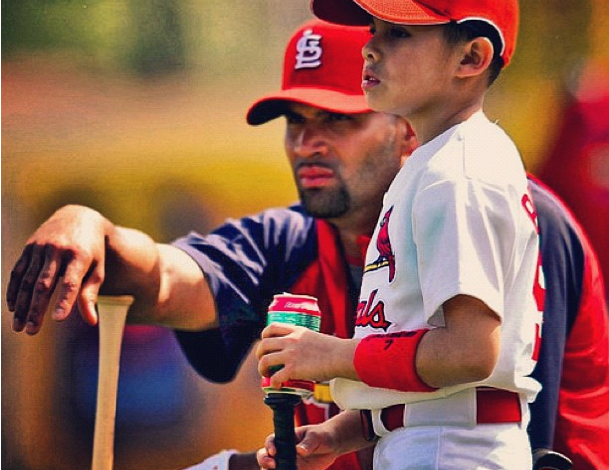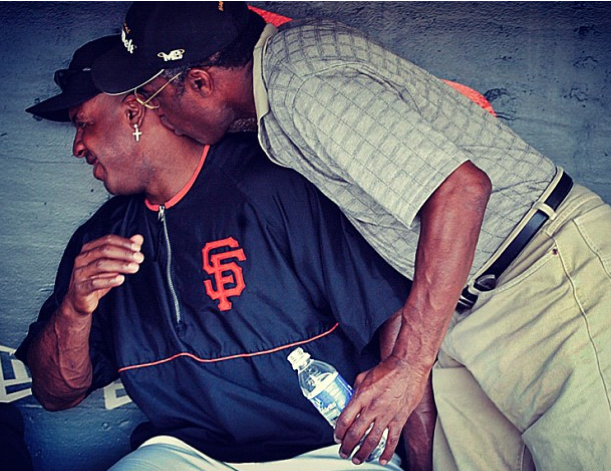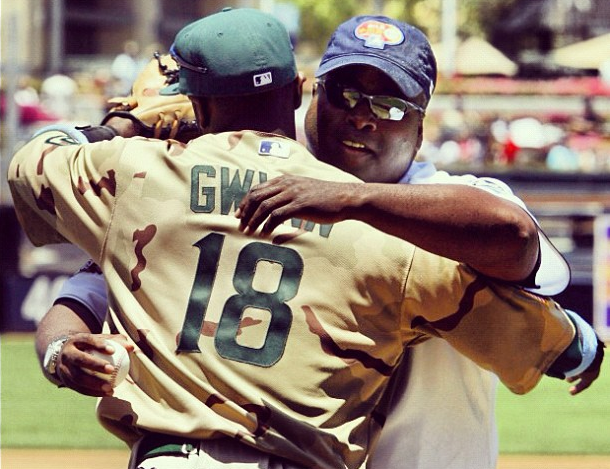Some of the biggest concerns that a baseball dad has when trying to be a coach and a parent is clarity.
They may struggle exactly how to approach guiding a baseball player effectively when that player is a family member.
It can be difficult because personal emotions are usually involved. Things can be much more easily taken for granted.
Being a baseball dad and parent is a relative process though. There really is no ultimate formula for doing so. There isn’t even an “adage” such as “you’re a baseball coach first dad second”….or vise versa.
With that being said there are a few things you can do to get the most out of your son by keeping him motivated and his eyes on the prize.
But wait! For you baseball coaches out there who have yet to coach you’re own “mini-me”, you can still get something out of this.
Coaching young players isn’t completely different from raising children. You’re still responsible for their development. There is just less risk involved….as long as you’re not including disillusioned parents who think their kid is the next Bryce Harper:)
Seek first to understand then be understood
Young players are always on the cusp of a great break through. Whether it’s a skill that will help them to better deal with peers or a skill that helps them turn on a 96 MPH fast-ball, these skills are always at the surface waiting to be brought up to the air.
As a baseball parent, you have to be willing to put the ego aside and transcend the need to be seen as an authority figure. If you truly feel you have fatherly advice to give, a player will always respond to the guidance more effectively from a genuine source.
By seeking first to understand before being understood, you’re paying attention to the real issue.
It’s not about you….it’s about you’re kid……and that requires that you listen much more than you speak. Ask open ended questions and attempt to delve deep into the process of your kid’s emotional and mental state. This is the best way to inspire a blossoming player who just needs someone they can trust.
Always be teaching
Never assume that coaching baseball ends at the ballpark with you’re child/player.
Whether a kid knows it or not, they’re always learning and when it comes to your behavior, they will attribute whatever example you’re demonstrating as being an adult.
Why is this important?
For example when you show a lack of poise in a “slow line” at the grocery your’e showing that it’s expectable to be impatient. Now I know emotions are natural and a part of being human, but why not take opportunities like these to show a level of patience that they can utilize when they need patience and poise in a key at-bat or defensive situation?
Everything is connected and there are no “ordinary moments”!
Don’t die with your music inside you
You’re a father who took up coaching for a reason. Whether it’s because you wanted to spend more time with your son or you wanted to give him the best opportunity to succeed, there was a genuine reason for taking on the mantle of Baseball coach/dad.
Do your son a favor and make that reason apparently obvious. When you do things with purpose every action become magnified and more convincing.
Teach and coach with passion and other people will be drawn to you as well and will ask “where do you get the energy to do what you do”?
Say yes to failure
You’ve probably heard me say this so many times that I’m sure you’re sick and tired of hearing it.
Failure is a good thing. The biggest lesson that you will ever give your player is that in order to succeed you must first fail.
Looking at failure as purely a feed-back mechanism will allow him to take bigger risks, become increasingly resilient, and have the ability to perform at his true potential when the pressure is on.
Playing with failure is what makes baseball different from every other sport simply because you fail more than you succeed.
Give your son the greatest gift by encouraging failure followed with the correct response.
Remember….it’s impossible to fail if you decide today that you will never give up.
Your son can be a reflection of your values…..demonstarte those values with purpose and you’ll find that your player/child is slowly starting to stand out from the other players…..and you’ll know why.
Are your a baseball parent? Did this article help? Tell me what your biggest take away was in the comments below. I would love to hear from you!



10 replies to "How to be an effective baseball dad and baseball coach"
I consider my son to be one of the best players on the team and, being a catcher, in a leader type role. My biggest challenge is how I react sometimes to my son’s behavior after he’s made an error or had a not so good plate appearance. I know that all players will make errors and strike out and although, I always try to stay positive and encouraging, it really is irritating when one of leaders of the team acts up, that could potentially drag the rest of the team down. That is not good for any team, especially when the game could be on the line. His plate reactions mostly, not always, occur when there are runners in scoring position and he fails to get them in, especially with two outs. He just turned 15 and I know he wants to field everything and bat 1000 and he feels like he can field everything and bat 1000. How do I REALLY get it across to him that, that just isn’t going to happen, or is it more of a case of getting more mature and realizing how hard baseball really is?
Thanks Mark!!
The emotional process does take time….which is why I believe mastering the fundamentals at an early age is so important so that you can rely on them while you develop mentally and emotionally.
With that being said, every negative emotion is in many ways a choice. I’m not saying we are able to choose how we feel but we always have the power to “choose” the response to how we feel. I hope this makes sense.
Mastering the emotional game of baseball begins with realizing we have a choice. When we strike out we can choose to get upset, or choose to learn from it.
The opportunity lies in not allowing anger and frustration keep us from noticing areas of opportunities that are all around us that will allow us to be successful!
God I love this game!!!!
Hope this help David and keep learning!!!!!!
Great article! My son is 10 years old and has been playing both Summer and Fall baseball since he was 6. I am seriously considering coaching a team for the first time in the Spring. I have been disappointed in the lack of teaching by some of his coaches in the past. Some of them act as though they are coaching a Major League Team. They yell and berate the kids for not doing something that they haven’t even been taught by the coach. They seem to forget that these are kids. The coaches are more interested in being a Manager rather than coaching and teaching. It’s all about them. I have never seen a young player get any better by fearing his coach. With the lack of proper coaching, I’ve done a lot of research about baseball on my own so that I can help my son enjoy the game more. That is what brought me across some of your Youtube videos and now your, “The Hitting Machine Academy”. I really like your overall sincere and positive approach to helping players, and parents of those players improve and enjoy the game of baseball more. It has given me the confidence to not only help my son, but to take on the difficult task of coaching his team. Thanks Mark!
Noel,
No thank you!!! Baseball need more people who coach and guide players for the right reasons. Let’s keep in touch and let me know if there is ever anything else I can do for you and you son!
I also coached my son during the Litttle League phase and enjoyed every minute of it. It gave me closer bond between me and my son and it gave me chance to not only teach about baseball but also about life lesson using baseball. More valuable time for me was when I had chance to be closer to my son not when he succeeded but when he failed on the field.
However when I coached the team, I actually gave less attention to my own son because I had a responsibilities of taking care of 12 player under my supervision. Because my son was one of the strong player, I was ok to leave him alone and allow him to just play his game.
Now that my son is in High school, my job is just sit back and enjoy watching him play and video taping and taking pictures of his games. I still watch for all the minor details during his game to give him my feedbacks at the end of the day. I am glad that I am still able to share something that can help him to be a better player, but I know one day that will not be possible anymore. I still try to give him a life lesson through baseball and also prepare him about his mental games and also his mental preparations.
I don’t know how long my son will continue playing baseball but I thank baseball for helping us build our relationship between me and my son.
Victor,
You’re the baseball parent fighting the good fight!
Your passion and commitment to your son is what keeps me motivated!
Lets stay in touch. I’ll call you to get a time for coffee on Fri!!
Mark you nailed it man, thanks for this article. I’m a big believer that if my two boys who I both coach for the same team succeed in the difficult game of baseball, then they can reach their potential in the game of life. Baseball lingo is a universal language among baseball fanatics, the language is so widespread that I find it difficult to capture my boys attention in a way that commands their complete attention. They start to drift off into another universe, but I have noticed that certain key words do make their ears perk up.
I’ve been a third base coach (and 1st) where my 9 yr old is who is playing up for the 11 yr old division is facing a pitcher with a fastball beyond what his hands and eyes are acclimated for. He stares over at me with a look of fright, the kid is fighting demons in his head and his body language tells me he wants his at bat to end quickly. The end result varies, but its these tough situations I need him to get through, slowly but surely hes becoming a 9 yr old that has the ability to master his emotions.
Thanks to you and your system, I’m proud to say that they use those positive affirmations you preach to reach higher state of mind and even teach me how to stay positive when were losing (ironic). From your audio book, where you give a clear glimpse of your career coming up and what you did to turn a bad situation into a good one. To the videos that mold my boys into better players by using drills coaches neglect to utilize.
Hope to have my boys meet you soon!
https://www.tumblr.com/blog/alvarez8314
Juan
Juan,
“Baseball lingo is a universal language among baseball fanatics, the language is so widespread that I find it difficult to capture my boys attention in a way that commands their complete attention. They start to drift off into another universe, but I have noticed that certain key words do make their ears perk up. ”
Sir that is a GREAT point!!! I really enjoyed reading what you’ve said and would like to talk more about the effectiveness of using words.
I TRULY appreciate your feedback in regards to the Hitting machine Academy. I’ve worked very hard putting the course together and hearing that it’s helping both parents and players actually gets me a little emotional! So thank you!
I would LOVE to meet your boys some time soon!
I am a dad baseball coach and I do believe it is difficult sometimes to seperate those two things. I have coached my son from T-ball until present and the reason I have is that there are some coaches out there that should not be on the field. Being in the military I travel and deploy and being a coach I can really see how the other coaches coach when I am on the field with them. A couple years ago I new I was going to be stationed in Korea for a year and we were new into Pony baseball and during tryout for the Pinto division one of the board members asked if I could grade the kids just incase they need somemore coaches because a lot of kids were showing up. Well it ended up that I did have to manage and pick a team and during the process of drafts and playing the season I really got to know a lot of the coaches and how they were with the kids and how the kids learned from them. Well I had to leave for Korea and there was about 2 weeks of the season left I had figured out who I would and would not want to coach my son the next season. So before I left I talked to the coach that I had grown to respect and we worked it out that he would coach my son the next year and for a couple years after that until we moved again. Well I did the same thing when I got to England I found a team I told them about me and they saw my son and they welcomed us to the team. Well I learned fast who I could count on and who I could not to help. Sorry I guess I am getting off on a tangent. I believe you can be a good dad baseball coach if you can take your dadism and put it aside. Like I said I have caoched my son sence he was in T-ball and he knows when we are on the field I am not his dad I am his coach and the other players learn fast that I treat him the same as all of them. I make them all do the same stuff if they need to run or do pushups to help there attitude they all get treated the same. If they struggle or don’t seam to be on the there game that day they sit. I would say the way I coach is more that I treat all the players as my own kid rather than treat my son like just a player.
Hope this made sence,
Sean Kiefer
Stcmkiefer,
That’s great that you’re able to designate the roles of being a baseball dad and coach in it’s respective places. There’s a time and place for everything.
How many years have you been in the military?